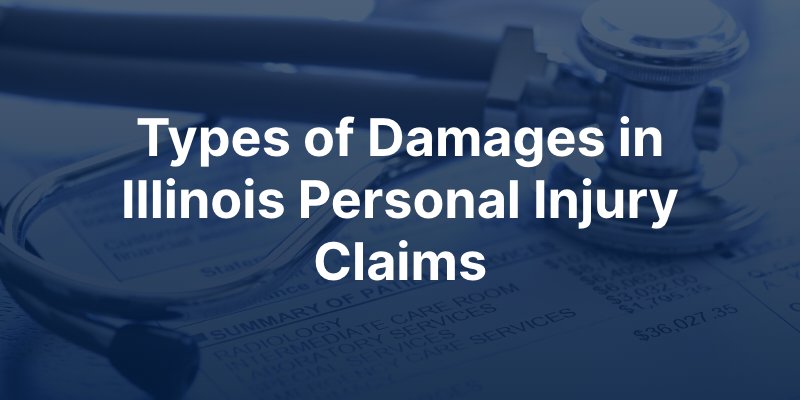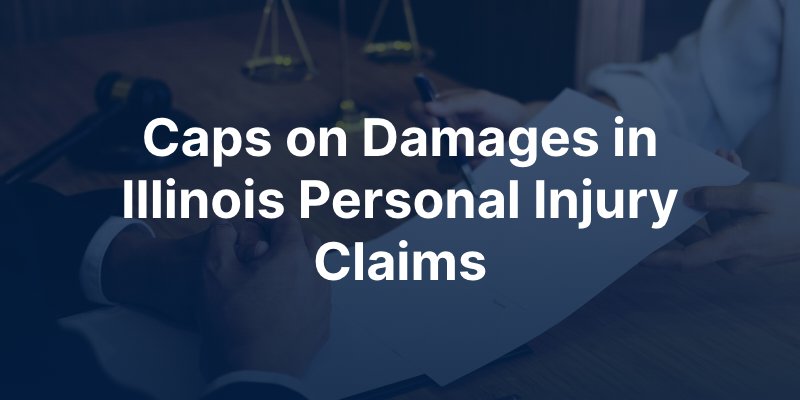What Types of Damages Can Be Recovered in Illinois Personal Injury Claims?
Request Free ConsultationA sudden painful injury can send the victim’s life spinning off-course in a moment, with impacts on their ability to accomplish daily tasks and support themselves and their families. When the injury directly resulted from someone else’s failure to take reasonable actions to prevent causing harm, the person or business at fault is legally responsible for compensating the victim. This typically occurs through an insurance policy. In Illinois, the courts offer victims legal redress through a personal injury claim. A successful personal injury claim in Illinois brings compensation for the consequences of an injury—known as “damages” in a personal injury claim or lawsuit.

Types of Damages in Personal Injury Cases in Illinois
A serious injury comes with significant financial losses that cause hardship to injury victims and their families. The recovery period may be painful and require medical procedures and rehabilitation. Some injuries are life-altering and cause disability. Illinois courts have three categories of damages available to victims in personal injury cases.
Economic Damages
Economic damages are the injury victim’s tangible financial losses. They are easy to calculate using medical bills, invoices, receipts, and employment records. Common economic damages include the following:
- Medical expenses
- Future injury-related medical costs
- Out-of-pocket expenses related to the injury
- Lost wages
- Future income loss
- Diminished future earning capacity
A personal injury attorney carefully calculates these tangible economic damages so the injury victim recovers the maximum amount available to them.
Non-Economic Damages
Non-economic damages are more difficult to calculate but they are often the most harmful aspect of an injury. Depending on the circumstances and severity of the injury, non-economic damages may include any or all of the following:
- Pain and suffering
- Emotional suffering (PTSD, anxiety, depression, or sleep disturbances)
- Loss of consortium (loss of a full physical and emotional relationship with a loved one)
- Loss of enjoyment of life
Financial compensation doesn’t erase non-economic damages like pain and suffering, but it relieves financial stress and allows injury victims to focus on their physical recovery.
Punitive Damages
Punitive damages are not available in all personal injury cases, but if the at-fault party’s actions were intentional or egregiously reckless, the injury victim may seek punitive damages meant to punish the wrongdoer and deter them from repeating the egregious behavior or action. Punitive damages are only awarded to the victim when there is clear evidence that the defendant acted intentionally or with disregard for the consequences to others.

Caps on Damages in Illinois Personal Injury Claims
Some states place caps, or limits, on the amount of compensation an injury victim may recover in a claim or lawsuit—particularly for non-economic damages. Some states also cap medical malpractice compensation. Illinois does not place caps on recovery for economic or non-economic damages, including in medical malpractice claims.
According to Illinois §2-1115.05 there is a cap on punitive damages. This section of the Illinois code states the following:
“The amount of punitive damages that may be awarded for a claim in any civil action subject to this Section shall not exceed 3 times the amount awarded to the claimant for the economic damages on which such claim is based.”
Comparative Fault Rules in Illinois Personal Injury Claims
Like many states, Illinois is a comparative fault state for personal injury cases. If the insurance company of the at-fault party finds that the injury victim was partly at fault for their injury, they assign them a percentage of fault and subtract that percentage from their compensation. As long as the injury victim is less than 50% at fault they may still recover a portion of their damages. For example, suppose one night a driver runs a red light and collides with a semi-tractor-trailer truck. It seems clear that the driver who ran the red light is responsible, but what if the truck’s trailer lacked the required lights, making it difficult to see at night so the driver who ran the light thought the intersection was clear? The insurance company could assign the truck driver or trucking company 25% of the fault. If the driver’s damages were $100,000, they’d still receive $75,000.
insurance adjusters sometimes attempt to assign an injury victim an undue percentage of fault to lower the amount the insurance pays out on a claim. Personal injury attorneys in Belleville protect their client’s interests through negotiations with insurance adjusters and take the case to court in a lawsuit if the insurance company uses bad-faith practices to protect their profits.
Survival Actions and Wrongful Death Claims in Illinois
When someone else’s negligent, reckless, or wrongful actions result in another person’s death, their close family members may file a personal injury claim on their behalf through a survival action or wrongful death claim. Depending on the circumstances of the death, an attorney may advise one type of claim or the other to maximize the amount of compensation the family recovers.
Survival Action Claims in Illinois
In a survival action claim, a family representative either named in the victim’s estate plan or by the court, files a claim against the at-fault party for the following:
- Medical expenses from the injury
- Lost wages during the time the decedent suffered from the injury before their death
- Pain and suffering
- Fear of imminent death
This type of claim may be the best option for family members of a person who lived for some time after their injury and suffered extended financial losses and pain due to the injury before they succumbed. The compensation awarded goes directly to the victim’s estate and then passes on to family members through the decedent’s estate plan or the state’s intestacy laws.
Wrongful Death Claim in Illinois
While a survival action reimburses the decedent’s estate, compensation in a wrongful death claim goes to the closest surviving family member—typically a spouse, child, or parent to compensate them for the loss of a provider. Damages in wrongful death claims in Illinois include:
- Funeral and burial costs
- Loss of income for the remaining earning years the victim would have had left to them had they not died
- Loss of benefits like health insurance and retirement contributions
- Grief and anguish
- Loss of consortium or companionship
A representative named in the victim’s estate, or by the court, represents the family in this claim and then distributes the compensation to the closest surviving family members.
What Is the Statute of Limitations on Personal Injury and Wrongful Death Claims in Illinois?
Illinois has a two-year statute of limitations on all personal injury claims, including wrongful death and survival action claims. The victim or family representative must file a lawsuit petition within two years of the date of the accident. Most personal injury claims in Illinois do not require a lawsuit. Instead, the insurance company offers a settlement. If the case does go to court, it must be within the two-year time limit. This protects the defendant against the long-term threat of a lawsuit.
